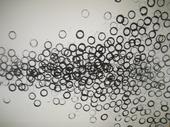Experience, contrary to common belief, is mostly imagination.
-Ruth Benedict (1887-1948)
I found the above quote in the opening pages to Euphoria by Lily King. It inspired me to tell a story, too. But this story is too long to tell in one shot, so here is the first installment.
Any “big” story found in philosophy most likely needs an introduction to the terms, rationalism and empiricism. These terms are present in philosophy and in science. Empirical science (how most of us use the word “science”) has developed stringent methods to ensure that its sampling, surveying, questioning, observations, record-keeping , interpretations and applications are done well enough so its findings can be trusted.
At the other end of science, and in the broader sense of the term, science (systematic and formulated knowledge), are the sciences that deal only with ideas, not with any observation or experience, such as mathematics and the disciplines that use math to develop knowledge beyond our ability to observe. No matter who you are, when you are, or where you are, 2+3=5. This is an example of rationalist science.
In philosophy, rationalism is defined as the school of thought that believes true knowledge and understanding come from discerning pure principles of mind, and combining those pure principles (rules, equations, laws, etc.) in order to reveal further true knowledge and understanding.
Empiricism, in philosophy, is the school that believes we can create knowledge and understanding by carefully observing our experiences. We use those experiences to reveal principles, laws and formulas.
Hopefully you’ve noticed, that both rationalism and empiricism (whether in philosophy or science) must depend upon some sort of standard of truth against which we can measure our mind’s actions and the links it makes between principles, between experiences, and between them both. There is one science whose job it is to reveal that standard: the science of logic, one of the fundamental divisions of study in philosophy.
Logic studies “the correct principles of rational thinking”. It is considered a pure science, a science of formulae, and it is normally considered the heart of rationalism. Like mathematics, logic is a body of pure ideas, principles, laws and equations. From it we derive an understanding of what can be said and still be logically supported. And thus from it, we gain our categorizations of rational versus irrational. Sane versus crazy. True versus false. Real versus hallucination.
And yes, logic is the standard that empiricists use to determine how to survey, study, question, collect, interpret and apply their observations, in other words, what they can learn from their experiences. If, in our writings, our words, our statements, our claims and our conclusions do not hold together logically when reporting our experiences, then they are flawed and the knowledge they present is considered weak. This system of using logic to derive a standard of truthfulness is fabulously useful and has given us much. However, as we’ll see below, with our recklessness, we often take more than is given.
Briefly explained, experience is what we call “particular” information. It is small – and we use it to try to make “bigger” information or universal principles (or rules) that we can trust, or in other words, that are “true” and “right”. But, experience only ever comes from a sample, or a portion of the universal. And yet we use it to try to make universal statements. We’ve learned through the study of logic that such claims of absolute truths from empirical inquiry cannot be logically supported as a sure truth. “Stretching” a small piece into a larger piece, thins its strength. The particular experience(s) cannot logically stretch into something as big as a universal law, yet I (and most likely you, too) often speak as if they can.
At most, we can make “probable” conclusions from them. And if we are careful in our inquiry, we can hope that our conclusions are “highly probable”. But, according to the universal principles of logic, never are they or will they be absolute. Never will they contain absolute certitude.
And that’s the first part of what is going to turn out to look like a catch-22.
Here is the second. Like all sciences, logic is based on a set of “first principles” – statements that define its realm and also act as the foundation from which all its further findings (truths) are built. The trick behind “first principles,” though, is that they themselves cannot be proven with absolute certitude. They are considered “self-evident” or in other words, so evident, that no one can deny them. Logic has four first principles:
- Identity – A thing is what it is, and not something else.
- The Excluded Middle – Between being and non-being, there is no middle state. It either is, or it isn’t.
- Sufficient Reason – Everything can be rationally explained. . . eventually.
- Contradiction – A thing cannot “be” and “not be” at the same time and in the same respect. Logic cannot contain contradiction.
How is it that these statements are considered “self-evident”? So obvious, so consistent that no one can deny them? They were determined as self-evident through the experiences of those that chose them and were accepted by their peers. Which shows us that for as much as both rationalism and empiricism depend upon the standard of truth provided by logic, logic depends upon experience and thus contains the uncertainty of experience. Our standard is not absolute. And we frequently have treated it as if it is. And we frequently have treated our rational and empirical “truths” as if they were absolute as well.
Now is time to begin meditating on our quote, “Experience, contrary to common belief, is mostly imagination” and await for next month’s post!
